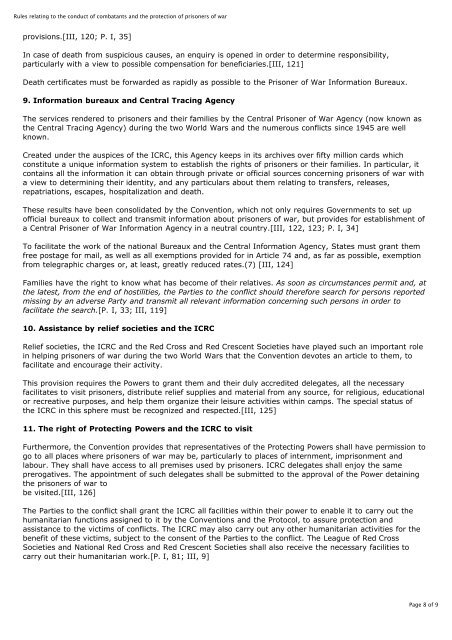The Law of War
The Law of War
The Law of War
Create successful ePaper yourself
Turn your PDF publications into a flip-book with our unique Google optimized e-Paper software.
Rules relating to the conduct <strong>of</strong> combatants and the protection <strong>of</strong> prisoners <strong>of</strong> war<br />
provisions.[III, 120; P. I, 35]<br />
In case <strong>of</strong> death from suspicious causes, an enquiry is opened in order to determine responsibility,<br />
particularly with a view to possible compensation for beneficiaries.[III, 121]<br />
Death certificates must be forwarded as rapidly as possible to the Prisoner <strong>of</strong> <strong>War</strong> Information Bureaux.<br />
9. Information bureaux and Central Tracing Agency<br />
<strong>The</strong> services rendered to prisoners and their families by the Central Prisoner <strong>of</strong> <strong>War</strong> Agency (now known as<br />
the Central Tracing Agency) during the two World <strong>War</strong>s and the numerous conflicts since 1945 are well<br />
known.<br />
Created under the auspices <strong>of</strong> the ICRC, this Agency keeps in its archives over fifty million cards which<br />
constitute a unique information system to establish the rights <strong>of</strong> prisoners or their families. In particular, it<br />
contains all the information it can obtain through private or <strong>of</strong>ficial sources concerning prisoners <strong>of</strong> war with<br />
a view to determining their identity, and any particulars about them relating to transfers, releases,<br />
repatriations, escapes, hospitalization and death.<br />
<strong>The</strong>se results have been consolidated by the Convention, which not only requires Governments to set up<br />
<strong>of</strong>ficial bureaux to collect and transmit information about prisoners <strong>of</strong> war, but provides for establishment <strong>of</strong><br />
a Central Prisoner <strong>of</strong> <strong>War</strong> Information Agency in a neutral country.[III, 122, 123; P. I, 34]<br />
To facilitate the work <strong>of</strong> the national Bureaux and the Central Information Agency, States must grant them<br />
free postage for mail, as well as all exemptions provided for in Article 74 and, as far as possible, exemption<br />
from telegraphic charges or, at least, greatly reduced rates.(7) [III, 124]<br />
Families have the right to know what has become <strong>of</strong> their relatives. As soon as circumstances permit and, at<br />
the latest, from the end <strong>of</strong> hostilities, the Parties to the conflict should therefore search for persons reported<br />
missing by an adverse Party and transmit all relevant information concerning such persons in order to<br />
facilitate the search.[P. I, 33; III, 119]<br />
10. Assistance by relief societies and the ICRC<br />
Relief societies, the ICRC and the Red Cross and Red Crescent Societies have played such an important role<br />
in helping prisoners <strong>of</strong> war during the two World <strong>War</strong>s that the Convention devotes an article to them, to<br />
facilitate and encourage their activity.<br />
This provision requires the Powers to grant them and their duly accredited delegates, all the necessary<br />
facilitates to visit prisoners, distribute relief supplies and material from any source, for religious, educational<br />
or recreative purposes, and help them organize their leisure activities within camps. <strong>The</strong> special status <strong>of</strong><br />
the ICRC in this sphere must be recognized and respected.[III, 125]<br />
11. <strong>The</strong> right <strong>of</strong> Protecting Powers and the ICRC to visit<br />
Furthermore, the Convention provides that representatives <strong>of</strong> the Protecting Powers shall have permission to<br />
go to all places where prisoners <strong>of</strong> war may be, particularly to places <strong>of</strong> internment, imprisonment and<br />
labour. <strong>The</strong>y shall have access to all premises used by prisoners. ICRC delegates shall enjoy the same<br />
prerogatives. <strong>The</strong> appointment <strong>of</strong> such delegates shall be submitted to the approval <strong>of</strong> the Power detaining<br />
the prisoners <strong>of</strong> war to<br />
be visited.[III, 126]<br />
<strong>The</strong> Parties to the conflict shall grant the ICRC all facilities within their power to enable it to carry out the<br />
humanitarian functions assigned to it by the Conventions and the Protocol, to assure protection and<br />
assistance to the victims <strong>of</strong> conflicts. <strong>The</strong> ICRC may also carry out any other humanitarian activities for the<br />
benefit <strong>of</strong> these victims, subject to the consent <strong>of</strong> the Parties to the conflict. <strong>The</strong> League <strong>of</strong> Red Cross<br />
Societies and National Red Cross and Red Crescent Societies shall also receive the necessary facilities to<br />
carry out their humanitarian work.[P. I, 81; III, 9]<br />
Page 8 <strong>of</strong> 9

















